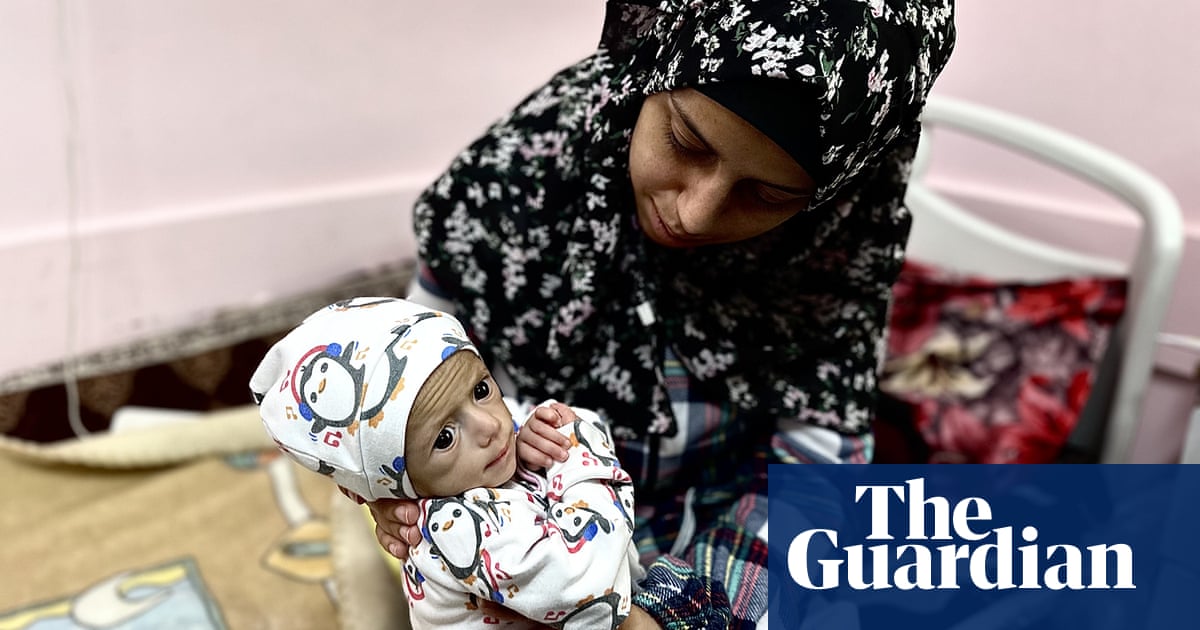The Heartbreaking Struggle of Six-Month-Old Siwar Ashour Amidst War in Gaza

In the midst of a devastating conflict, a six-month-old Palestinian girl named Siwar Ashour stands as a poignant symbol of suffering and survival. Born into a world marked by war and hunger, Siwar has known nothing but peril and deprivation since her birth on November 20, 2022. Weighing only 2.5 kilograms at birth, her frail and emaciated body starkly represents the ongoing humanitarian crisis in Gaza, a situation exacerbated by the relentless conflict that erupted in October 2023.
Siwar's life has been fraught with challenges from the very beginning. She suffers from a severe oesophageal condition that makes it extremely difficult for her to consume breast milk, which has rendered her reliant on specialized formula—an item that is now in critically short supply due to the ongoing blockade and destruction. Her parents reside in al-Nuseirat, located halfway along the coast of the Gaza Strip, where they have endured the horrors of war firsthand. Their home was bombed early in the conflict, forcing the family to live in makeshift tents that failed to provide adequate shelter or sustenance.
The war began when Hamas launched an attack on Israel that resulted in the tragic loss of 1,200 lives, prompting a harsh Israeli response that has, to date, claimed the lives of over 52,000 individuals in Gaza. As the conflict raged on, Siwar's family found themselves displaced time and again, struggling to find safety and basic necessities. Their attempts to return to al-Nuseirat to stay with Siwar's grandparents were thwarted when that home was also bombed, leaving them to share a single room with eleven others.
Najwa Aram, Siwar’s 23-year-old mother, recalls the overwhelming exhaustion she faces daily. “There was no privacy, and I couldn’t get any rest,” she said, expressing her concerns for both her daughter and herself. “There was no food or proper nutrition, and when I gave birth to her, she was not like other babies.” Najwa reflects on Siwar's fragile beauty, describing how, despite her visible weakness at birth, she was still charming. However, she now laments that Siwar is unnaturally thin; babies her age typically weigh at least six kilograms, yet Siwar's weight fluctuates between a mere 2 to 4 kilograms.
In a cruel twist of fate, Najwa recently learned she is pregnant with her second child, heightening her anxiety about Siwar’s precarious health. After moving to Khan Younis to stay with her mother, Najwa spent the majority of the past few months in and out of hospitals, desperate for care for her ailing daughter. Compounding their hardship, her husband Saleh is blind and was unable to join them, remaining in al-Nuseirat. The couple's separation has been difficult, as Najwa reveals how deeply Saleh cares for Siwar, despite his own limitations.
With no source of income, the family has become reliant on charity kitchens and humanitarian assistance. Yet, as the total blockade of Gaza approaches its 70th day, such aid remains in short supply. Philippe Lazzarini, the head of the United Nations Relief and Works Agency (UNRWA), recently described the situation in Gaza as a “manmade and politically motivated starvation,” indicative of the absolute cruelty faced by its residents.
“We are down to one sack of flour and a few tins of food,” Najwa explained, highlighting the grim reality for her family. The special formula that Siwar desperately needs is becoming increasingly scarce, further endangering her health. “I am also suffering from malnutrition, and Siwar refuses to breastfeed, crying instead,” she added, explaining her increasing reliance on formula, which is now depleting at an alarming rate.
Throughout March, Najwa and Siwar spent critical time in a hospital in Deir al-Balah, where they managed to find a suitable formula that allowed Siwar’s weight to rise to 4kg. “That made me hopeful,” Najwa said, recalling the fleeting moments of joy when Siwar began to smile and play. However, their hope was shattered shortly after their discharge, as Siwar began losing weight again. They are currently at Nasser Hospital in Khan Younis, where the medical situation is dire. “Every day, five to ten new cases of malnutrition are being reported,” said Dr. Ahmed al-Farah, the director of the children’s and maternity building at the hospital. “We are witnessing severe cases, and the malnutrition is horrifyingly visible in children.”
Resources are rapidly dwindling at Nasser Hospital, with only enough fuel left to power generators for another 48 hours. The hospital has already begun cutting off electricity on administrative floors to extend power supply to the wards filled with sick children. “We are helpless,” Dr. Farah lamented. “We cannot provide food, supplements, or appropriate medications for their conditions.” The stark reality of malnutrition, which he once studied as a theoretical concept, is now vividly manifesting in the lives of children like Siwar. “I call on the world to see us as human beings—we were created just like everyone else,” he urged.



























